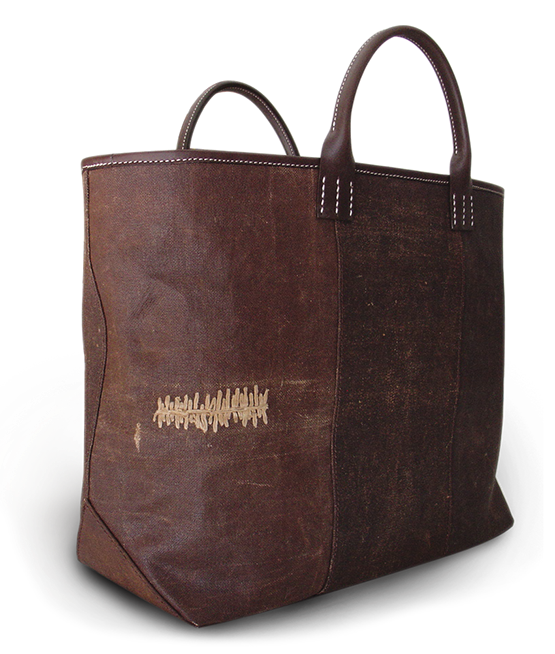
酒袋 SAKABUKURO
"SHIB"に使われている酒袋は主に清酒造りで有名な兵庫県、灘の名酒の酒蔵より出された酒袋で
す。酒袋は江戸時代に始まり20世紀初頭まで、濁り酒の糀を漉すために使われていた酒造りには
欠かせない道具でした。毎夏、酒作りの職人が防水性、耐久性を維持して強固な酒袋にするため
柿渋を何度もくり返し塗りました。生成りの綿布はそのうち黒光りした革のような風合いに変化
したのです。いくつかの"SHIB"には大胆な"むかで縫い"と呼ばれる継ぎが施されています。太い
綿糸で丁寧に丁寧に継がれたものです。美しくもあります。道具として長い間、大切に扱われて
いた気配が今でも伝わってくる、やさしさと力強さを備え持った魅力的な素材です。
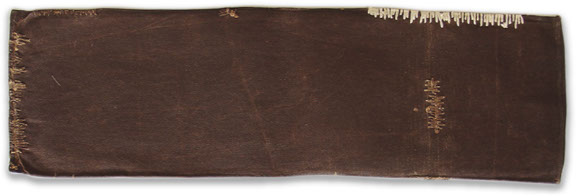
The cotton sack used for SHIB comes directly from the warehouse of the brewer,the
reputable sake brand coming from the city of Nada in Hyogo Japan, also a famous
area for producing refined sake. Brewers used the sack "Saka-bukuro" during the Edo-
period to filter "Nigori-sake"(unrefined sake) into "Seishu"(refined sake). This process
was used up until the early 20th century. Every summer, craftsmen repeatedly applied persimmon juice on sakabukuro to improve waterproofing and antiseptic properties.
Due to this process, the cotton fabric's appearance has changed, similar to tinged
brown leather. Patches seen in a few places are called "Mukade-nui" (centipede
stitching), stitched by thick cotton threads with care.An alluring texture of strength
and warm-heartedness, reminiscent of the long history of brewers' ceaseless precision
and diligence.
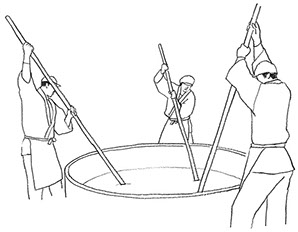
1:
酒母をつくる醪を仕込む
酒母造りとは、酵母を増やす行程のことで、
「もとだて」とも言います。酵母は糖分を発
酵してアルコールにする力を持つ微生物で
清酒を造る主役です。アルコールだけでなく、
豊潤な吟醸の香りや、香味をつくり出すのも
酒母のおかげです。つぎに酒母に麹、蒸米、
水を加え、醪(もろみ)を造ります。醪造り
は一度に仕込むのではなく「三段仕込み」と
いって通常三回に分けて行います。最初が
「初添(はつぞえ)」、二回目が「仲添(なかぞえ)」、三回目が「留添(とめぞえ)」と呼ばれ、
一度に量を増やすと酵母が発酵不能を起こすため、そのつど量をすこしづつ増やしていきます。
留添を終えた醪(もろみ)は、温度管理をしながら二十日間ほど放置されます。
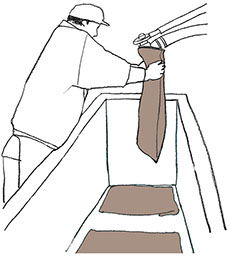
発酵した醪を酒袋に流し込む
長い時間と手間をかけて大切に醸された醪
は、発酵が終了して熟成醪となり、上槽とい
う搾りの工程を経て、新酒と酒粕に分けられ
ます。仕込みタンクから、ポンプで運ばれて
きた醪を酒袋の中に入れる作業です。醪を
入れる量は蔵元杜氏の勘なのですが、入れ
すぎると搾る際に酒袋が破裂したり、また
少なすぎると、搾った後の酒粕の出来が悪く
なるなど微妙な具合に影響が出る経験の必要
な工程です。酒袋は、手織の木綿で酒造りの
ない夏期に、丁寧に柿渋が塗られます。毎夏、
2 :
柿渋を塗ることにより丈夫で、防腐性・防水性のある生地になります。柿渋の効用で、酒袋の
生地は極めて丈夫で、また軽いのが特徴です。現在は、自動圧搾機が普及し効率化がはかられ、
酒袋を使ってお酒を絞る酒蔵は少なくなり、また抗菌に優れた化学繊維の酒袋もあり、柿渋を
塗られた本物の酒袋はかなり希少な存在となりました。
3 :
袋取り

4 :
はねぎ絞り
酒袋に詰められた熟成醪は、舟底に形が似
ていると「槽(ぶね)」と、名付けられた
「木槽(きぶね)」に一つ一つ丁寧に並べ
て折り重ねられます。「袋取り」と呼ばれる
作業です。醪は、水分が多く一袋はかなりの
重量です。積み上げる時には、酒袋を持って
かがむのでかなりの重労働です。そして、次
の搾りの工程に進み、時間をかけてゆっくり
と新酒が搾られます。ここにも、蔵元杜氏の
技が光ります。酒袋同士の重さで、待ちかね
たように出てくる最初の酒を「荒走り」と
いいます。

大きな木槽に酒袋を敷き並べた後は、その上
から木の板を重ね蓋をします。「はね木」と
呼ばれる八メートル程の一本の巨木を天井
から吊るし、一方に重石を吊るし、その重さ
で木槽に圧力を掛けゆっくりお酒を搾り出し
ます。重さの加減はすべて職人の腕加減。
手仕事の技。圧力をそこまでかけず、優しく
搾るため、手間はかかりますが雑味の出ない
日本酒本来の味わいを楽しめます。機械に
よる搾りでは酒袋を完全に搾り出し、嫌な味まで搾り出してしまいます。酒袋は酒造りに手間と
時間を惜しまない職人達によって守られ愛用されてきた欠かせない道具でした。裂けたところを
繕ったのも当時の職人の手によるものです。丁寧な繕いの一目一目にも、酒造りへの愛を感じます。
柿渋染め PERSIMMONJUICE DYEING
柿渋は夏、まだ青いうちの渋柿の果実を砕いて絞った液を壷やカメに収め、冷暗所に三ヶ月から
一年ほど放置し発酵、熟成させた天然の耐水顔料です。常温で浸染めか引き染めをし、その後日光
にあてて発色させます。初めは薄いベージュ色ですが、何度もくり返す内に赤茶色、焦茶色と濃い
色になり、生地も硬く革のような風合いに変化していきます。その防水性から昔は魚網、漆器の
下塗り、番傘、雨合羽、染色型紙などには必ずこの柿渋が塗られていました。 "SHIB"は酒袋の
なかでも稀少価値の高い、革のようなしなやかな強度と黒光りした深い色を持った酒袋を素材に
しています。二つとして同じ色合いのモノは無く、色ムラ、傷は、丁寧な柿渋の行程を何度も、
何度もくり返した結果生まれた酒袋特有の風合いです。 名酒を作る道具として何年も使われて
きた存在感をご愛用ください。
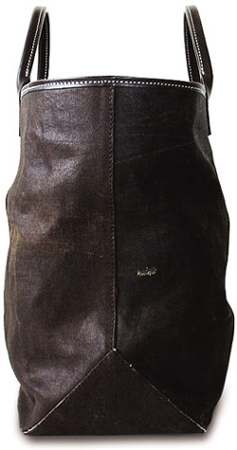
Persimmon juice is a natural waterproofing
pigment. It is extracted after not-yet-ripe,
astringent persimmons are crushed and
squeezed into liquid, which is then kept in
clay pots in a dark, cold area so the liquid
can ferment and age for three months to
one year. The cloth is exposed to sunlight
for coloring after immersing it in the
persimmon juice or brushing the juice over
the cloth at room temperature. At the
beginning, the cloth appears light beige.
As it is dyed repeatedly, however, the cloth
turns darker, from red brown to umber.
During this period,the cloth also turns into
a hard, leather-like texture. Because of its
high waterproofing property, persimmon
juice was always applied to fishing nets,
as a base coat for japan ware, to coarse
oil-paper umbrellas (bangasa in Japanese),
rainwear, and stencil patterns. "SHIB" are
made from hard-to-find,dark sakabukuro
cloth that is elastic,like leather,and has a
black shiny appearance.
No two "SHIB" are the same color.
Blurring and scratching reflect the unique texture of "Sakabukuro" cloth to which
persimmon juice was applied repeatedly over the years.
Enjoy the esthetic texture of exquisite sakabukuro cloth
once used for making exquisite sake.
革職人 LEATHER-CRAFTS ARTISANS
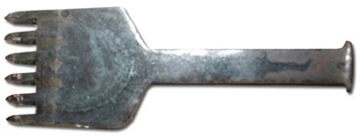
"SHIB"は丁寧な手仕事で見事な鞄を創り出す職人達によって、ひとつひとつ縫製されています。
実は一枚ごとに表情の違う酒袋という素材に立ち向かえる職人を探すのは容易なではありません
でした。 確実に、丁寧に、美しく仕上げる職人はすぐに見つける事ができましたが、大きさ、色、継ぎ
はぎなど一枚として同じもののない不揃いな、しかも年代物で稀少価値が高く、鋏の入れづらい
酒袋を引き受けてくれる人はなかなか見つからなかったのです。それは正確無比な職人気質だけ
ではなく、大胆な決断力と独創性を必要とする仕事でした。そんな中、巡り合えたのは「革を読む
感性」に優れ、素材の「個性」を存分に活かす革を知り尽くした職人でした。 革を相手に技術を駆使
する彼らの技は、柿渋を何度も塗り固められ革のように硬くなった酒袋の個性を「楽しみ」 その
特性を十二分に「読み」、大胆にそして的確な感覚で縫い上げる糸やステッチの運びを決め納得の
いく持ち手を組み合わせ酒袋トートの完成を実現させてくれました。"SHIB"のものとしての
生命力は、こうした職人の優れた手技と決断力によって生まれたのです。
Every "SHIB" is sewn by hand with artisanal skills and dedication by
the craftsmen that we finally able to find.
Each vintage "Sakabukuro" cloth has a different
appearance, delicate texture and condition,
therefore it was not easy to find craftsmen
who can confront with this difficult material.
Finishing the work precisely and carefully with trained skills was not enough.
We searched for craftsman whose work was bold and showed extreme originality.
Craftsmen that could handle these various cloths -so old and rare, moreover, cloths in different sizes, colors, and designs. That was when we came across to these incredible leather craftsmen who are famous for making reins and bridles for horses. They had the excellent sensitivity of 'reading' leather textures, and they knew how to make the most of the uniqueness of materials. Their knowledge of leathers and their beautifully refined handling skills were enough to 'read' the quality of the leather-like "Sakabukuro" cloth. Their skills were perfectly aligned to "enjoy" the cloths character, and to bravely "determine" how to sew each individual stitch to complete the much-awaited "SHIB" tote bags. Gloriously hand-made by those leather-crafts artisans with willpower and instinct, each "SHIB" product has its very own heartbeat.
馬具用ブライドルレザー BRIDLE LEATHER
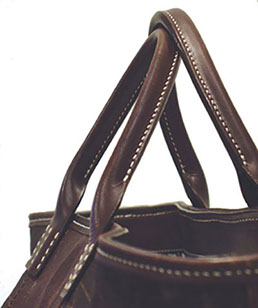
ハンドル、他、使用している"SHIB"の皮革はすべて乗馬用の手綱やブライドル(馬頭につける
おもがい)に使われるブライドルレザーと呼ばれる選ばれた牛革です。皮革本来の風合いを生かす
為にタンニン(植物の渋)で鞣すことにより、しなやかで伸びやかな皮革になります。使いはじめに
皮革が薄ら白く見えるのは、パラフィン(蝋)の成分です。"タンニン鞣し" の工程で、革そのものが
呼吸をしているかのようにパラフィン成分が表面に滲み出でくるのです。そして、使い込む程に
艶を帶び、深みのある色に変化していきます。"タンニン鞣し"を施した皮革は、手に持ったり、
身に付けたり、傍らにあるだけで「落ち着いた気持ちにさせる」作用があると言われます。自然の
大きな力です。長くご愛用していただくためにブラシや柔らかな布でのお手入れを勧めします。
ブライドルレザーは、SHIB / L , Mサイズで使用しております。
Leathers used for handles and other parts of SHIB products
are called “bridle leather”, which is used for reins and bridles of horses.
Tanning processes using persimmon juice keeps the natural texture
and allows the leather to remain supple.
Paraffin can be seen as a subtle whiteness on the leather
at the beginning of use. Within the process of tanning,
paraffin oozes out to the surface as if the leather itself
has begun breathing. The color will become richer and
burnished after being used repeatedly.
Tanned leather is said to be able to heal and comfort
just by having it by your side or holding it in your hand.
We wish you to embrace the great power of nature.
We recommend you to groom with a brush
or a soft cloth for prolonged use.

